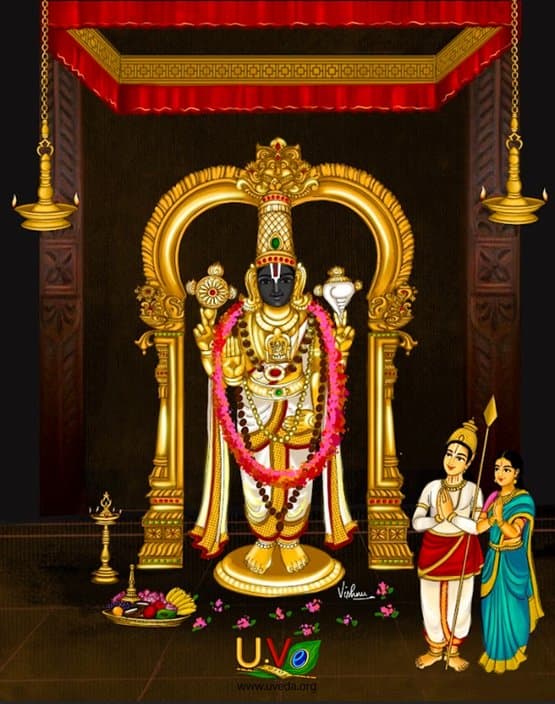Chapter 4
Thiruneermalai - (அன்று ஆயர்)
திருநீர்மலை

This region refers to the lord of Thiruneermalai. Due to the mountain being surrounded by water as a natural fortification, the mountain here is known as Neermalai. The name of the mountain also extended to the village. The Lord residing here is known by the name Neervannan. If you go to Nachiyar Koil, you can worship the Lord in a standing posture;
இப்பகுதி திருநீர்மலை எம்பெருமானைக் குறிக்கிறது. மலையைச் சுற்றி நீர் அரணாக அமைந்துள்ளபடியால், இவ்வூரிலுள்ள மலை நீர்மலையாயிற்று. மலையின் பெயரே ஊருக்கும் ஏற்பட்டது. இங்கிருக்கும் பகவானுக்கு நீர்வண்ணன் என்று திருநாமம். நாச்சியார் கோவில் என்ற ஊருக்குச் சென்றால், நின்ற திருக்கோலத்தில் பகவானைச்
Verses: 1078 to 1087
Grammar: Eṇcīrk Kaḻinediladi Āsiriya Viruththam / எண்சீர்க் கழிநெடிலடி ஆசிரிய விருத்தம்
Recital benefits: Will rule this world surrounded by the wide oceans under a royal umbrella and become gods in the sky
- PT 2.4.1
1078 ## அன்று ஆயர் குலக் கொடியோடு * அணி மா மலர் மங்கையொடு அன்பு அளவி *
அவுணர்க்கு என்றானும் இரக்கம் இலாதவனுக்கு * உறையும் இடம் ஆவது **
இரும் பொழில் சூழ் நன்று ஆய புனல் நறையூர் திருவாலி குடந்தை * தடம் திகழ் கோவல்நகர் *
நின்றான் இருந்தான் கிடந்தான் நடந்தாற்கு இடம் * மா மலை ஆவது நீர்மலையே 1 - PT 2.4.2
1079 காண்டா வனம் என்பது ஓர் காடு * அமரர்க்கு அரையன்னது கண்டு அவன் நிற்க * முனே
மூண்டு ஆர் அழல் உண்ண முனிந்ததுவும் அது அன்றியும் * முன் உலகம் பொறை தீர்த்து **
ஆண்டான் அவுணன் அவன் மார்வு அகலம் * உகிரால் வகிர் ஆக முனிந்து * அரியாய்
நீண்டான் குறள் ஆகி நிமிர்ந்தவனுக்கு இடம் * மா மலை ஆவது நீர்மலையே 2 - PT 2.4.3
1080 அலம் மன்னும் அடல் சுரி சங்கம் எடுத்து * அடல் ஆழியினால் அணி ஆர் உருவின் *
புலம் மன்னும் வடம் புனை கொங்கையினாள் * பொறை தீர முன் ஆள் அடு வாள் அமரில் **
பல மன்னர் படச் சுடர் ஆழியினைப் * பகலோன் மறையப் பணிகொண்டு அணிசேர் *
நில மன்னனும் ஆய் உலகு ஆண்டவனுக்கு இடம் * மா மலை ஆவது நீர்மலையே 3 - PT 2.4.4
1081 தாங்காதது ஓர் ஆள் அரி ஆய் * அவுணன் தனை வீட முனிந்து அவனால் அமரும் *
பூங் கோதையர் பொங்கு எரி மூழ்க விளைத்து அது அன்றியும் * வென்றி கொள் வாள் அமரில் **
பாங்கு ஆக முன் ஐவரொடு அன்பு அளவிப் * பதிற்றைந்து இரட்டிப் படை வேந்தர் பட *
நீங்காச் செருவில் நிறை காத்தவனுக்கு இடம் * மா மலை ஆவது நீர்மலையே 4 - PT 2.4.5
1082 மாலும் கடல் ஆர மலைக் குவடு இட்டு * அணை கட்டி வரம்பு உருவ மதி சேர் *
கோல மதிள் ஆய இலங்கை கெடப் * படை தொட்டு ஒருகால் அமரில் அதிர **
காலம் இது என்று அயன் வாளியினால் * கதிர் நீள் முடி பத்தும் அறுத்து அமரும் *
நீல முகில் வண்ணன் எமக்கு இறைவற்கு இடம் * மா மலை ஆவது நீர்மலையே 5 - PT 2.4.6
1083 பார் ஆர் உலகும் பனி மால் வரையும் * கடலும் சுடரும் இவை உண்டும் * எனக்கு
ஆராது என நின்றவன் எம் பெருமான் * அலை நீர் உலகுக்கு அரசு ஆகிய ** அப்
பேரானை முனிந்த முனிக்கு அரையன் * பிறர் இல்லை நுனக்கு எனும் எல்லையினான் *
நீர் ஆர் பேரான் நெடுமால் அவனுக்கு இடம் * மா மலை ஆவது நீர்மலையே 6 - PT 2.4.7
1084 புகர் ஆர் உரு ஆகி முனிந்தவனைப் * புகழ் வீட முனிந்து உயிர் உண்டு * அசுரன்
நகர் ஆயின பாழ்பட நாமம் எறிந்து அது அன்றியும் * வென்றி கொள் வாள் அவுணன் **
பகராதவன் ஆயிரம் நாமம் * அடிப்பணியாதவனை பணியால் அமரில் *
நிகர் ஆயவன் நெஞ்சு இடந்தான் அவனுக்கு இடம் * மா மலை ஆவது நீர்மலையே 7 - PT 2.4.8
1085 பிச்சச் சிறு பீலி பிடித்து உலகில் * பிணம் தின் மடவார் அவர் போல் * அங்ஙனே
அச்சம் இலர் நாண் இலர் ஆதன்மையால் * அவர் செய்கை வெறுத்து அணி மா மலர் தூய் **
நச்சி நமனார் அடையாமை * நமக்கு அருள்செய் என உள் குழைந்து ஆர்வமொடு *
நிச்சம் நினைவார்க்கு அருள்செய்யும் அவற்கு இடம் * மா மலை ஆவது நீர்மலையே 8 - PT 2.4.9
1086 பேசும் அளவு அன்று இது வம்மின் * நமர் பிறர் கேட்பதன் முன் பணிவார் வினைகள் *
நாசம் அது செய்திடும் ஆதன்மையால் * அதுவே நமது உய்விடம் நாள் மலர் மேல் **
வாசம் அணி வண்டு அறை பைம் புறவின் * மனம் ஐந்தொடு நைந்து உழல்வார் மதிஇல் *
நீசர் அவர் சென்று அடையாதவனுக்கு இடம் * மா மலை ஆவது நீர்மலையே 9 - PT 2.4.10
1087 ## நெடுமால் அவன் மேவிய நீர்மலைமேல் * நிலவும் புகழ் மங்கையர் கோன் * அமரில்
கட மா களி யானை வல்லான் * கலியன் ஒலி செய் தமிழ் மாலை வல்லார்க்கு ** உடனே
விடும் மால் வினை வேண்டிடில் * மேல் உலகும் எளிது ஆயிடும் அன்றி இலங்கு ஒலி சேர் *
கொடு மா கடல் வையகம் ஆண்டு * மதிக்குடை மன்னவர் ஆய் அடி கூடுவரே 10